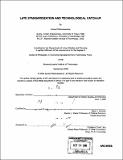| dc.contributor.advisor | Alice H. Amsden. | en_US |
| dc.contributor.author | Ratanawaraha, Apiwat, 1972- | en_US |
| dc.contributor.other | Massachusetts Institute of Technology. Dept. of Urban Studies and Planning. | en_US |
| dc.date.accessioned | 2008-01-10T17:20:32Z | |
| dc.date.available | 2008-01-10T17:20:32Z | |
| dc.date.copyright | 2006 | en_US |
| dc.date.issued | 2006 | en_US |
| dc.identifier.uri | http://dspace.mit.edu/handle/1721.1/37674 | en_US |
| dc.identifier.uri | http://hdl.handle.net/1721.1/37674 | |
| dc.description | Thesis (Ph. D.)--Massachusetts Institute of Technology, Dept. of Urban Studies and Planning, 2006. | en_US |
| dc.description | Includes bibliographical references (p. 325-335). | en_US |
| dc.description.abstract | In this study, we examine the process of "late standardization," in which latecomers engage in standards activities in order to move towards and beyond the technological frontier. Based on case studies of latecomers in the semiconductor and mobile telecommunication industries in South Korea and Thailand, we analyze the strategic, organizational, and institutional aspects of the late-standardization process. We hypothesize that latecomer firms and states must engage in standards activities to progress beyond catch-up, because standards are a prerequisite to technological development. Standards are strategic leverages that allow latecomers to link with and learn from technology leaders. Specifically, latecomer firms have to engage internally in quality standardization to take advantage of latecomer advantages. Quality standards help improve production capability, while enhancing credibility and reputation. Without quality control, latecomers cannot become part of global value chains and have difficulty in acquiring advanced technologies from forerunners. As latecomers become fast followers, they have to participate in external standardization. The goal is to acquire knowledge about emerging technologies and standards. | en_US |
| dc.description.abstract | (cont.) By linking with and learning from forerunners, fast followers enhance second-mover advantages derived from ramp-up capability. Once their R&D efforts bear fruit and they become technology leaders, advanced "late standardizers" have to lead external standardization efforts. This would enable them to exploit innovation capability and gain first-mover advantages derived from proprietary technologies and learning-curve effects. As latecomers move towards the technological frontier, standards activities become the core of research and development strategy and policy. They also adjust organizational structures and human resource management to accommodate standards efforts. The state plays critical yet changing roles throughout the late-standardization process. It sets up standards institutions and provides "infratechnologies" for quality control. The state also mitigates technology and market risks associated with new standards, while facilitating networking among late-standardizing firms. As late standardizers become technology and standards leaders, the state pursues "standards diplomacy" for overseas adoption of its domestic standards, while strengthening the protection of intellectual property rights. | en_US |
| dc.description.statementofresponsibility | by Apiwat Ratanawaraha. | en_US |
| dc.format.extent | 335 p. | en_US |
| dc.language.iso | eng | en_US |
| dc.publisher | Massachusetts Institute of Technology | en_US |
| dc.rights | M.I.T. theses are protected by copyright. They may be viewed from this source for any purpose, but reproduction or distribution in any format is prohibited without written permission. See provided URL for inquiries about permission. | en_US |
| dc.rights.uri | http://dspace.mit.edu/handle/1721.1/37674 | en_US |
| dc.rights.uri | http://dspace.mit.edu/handle/1721.1/7582 | |
| dc.subject | Urban Studies and Planning. | en_US |
| dc.title | Late standardization and technological catch-up | en_US |
| dc.type | Thesis | en_US |
| dc.description.degree | Ph.D. | en_US |
| dc.contributor.department | Massachusetts Institute of Technology. Department of Urban Studies and Planning | |
| dc.identifier.oclc | 124507392 | en_US |
